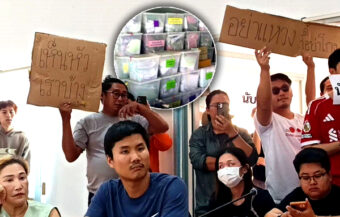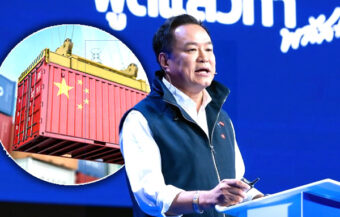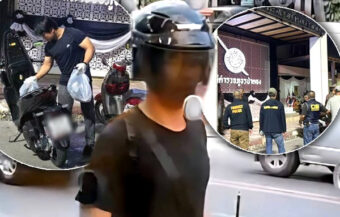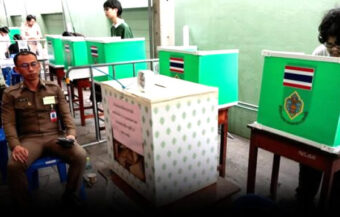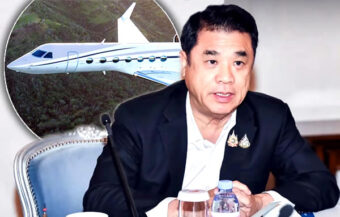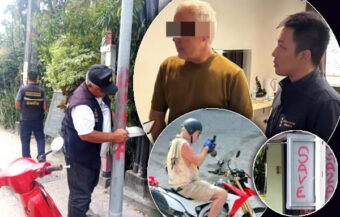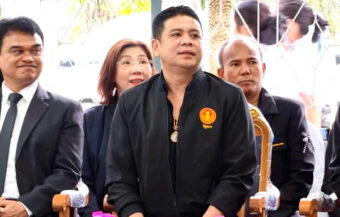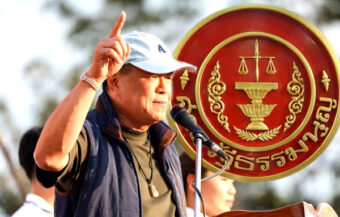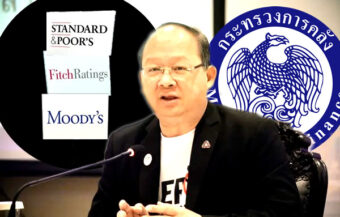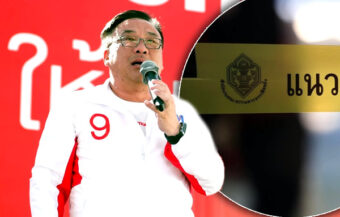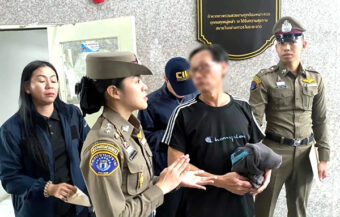Pheu Thai fights for its political survival in Sisaket as the Bhumjaithai-People’s Party alliance pushes a top-down charter rewrite. Sunday’s by-election becomes a high-stakes battle for democracy, local voter loyalty and the political future of northeastern Thailand.
Pheu Thai heavyweights have stormed Sisaket to back Phurika Sommai in Sunday’s by-election, now a showdown with national stakes. Nattawut Saikua calls it a referendum on Prime Minister Anutin’s sudden rise, propped up by the People’s Party. Pheu Thai warns of a backroom alliance between conservatives and progressives to force through an unelected charter rewrite. For them, this isn’t just a local vote—it’s a fight for democracy against a political power grab in Bangkok.
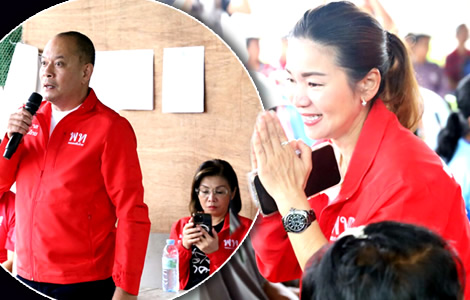
The upcoming Sunday by-election in Sisaket will unfold under a cloud of fear, uncertainty, and deep political stakes. For weeks, the province has been on edge. Armed tensions along the Thai-Cambodian border have rapidly intensified, placing local communities on high alert. Reports in the last 48 hours have confirmed the movement of Cambodian tanks and missile launchers near the frontier.
Consequently, many residents in eastern Sisaket have started to evacuate without waiting for official orders. They fear a repeat of the July border clashes, which left villages destroyed and lives upended.
During that outbreak of violence, Sisaket suffered more than any other province. Mortar shells damaged homes and schools. Entire communities were displaced. Yet, to date, many victims have received little or no compensation.
Stalled government aid and unpaid compensation are fueling anger ahead of the crucial Sunday election
Promised government payments have stalled. As a result, anger continues to simmer among locals, especially in Constituency 5—the very district now heading into a critical vote. This lingering resentment over broken promises may play a decisive role in Sunday’s result.
At the heart of the political contest is Prime Minister Anutin Charnvirakul and his ruling Bhumjaithai Party. Having taken office at the start of September with backing from the People’s Party, Anutin is under intense pressure to prove his leadership has broad national support.
A win in Sisaket would bolster his image and give weight to the coalition’s recent alignment. However, the battle is far from one-sided. Pheu Thai, the former ruling party, is fighting to regain momentum and reassert itself in the northeast.
Over the past week, Pheu Thai has rolled out a full campaign offensive. On September 26, senior party leaders descended on Khun Han District to rally support. Manoporn Charoensri, an MP for Nakhon Phanom, and veteran strategist Nattawut Saikua led the charge. They visited multiple communities, including Ban Phu Fai, Wat Arun Sawang, Ban Kram, and Wat Pho Wong, calling on voters to back candidate Phurika Sommai. Their message was clear: this by-election is not just local—it’s national.
Nattawut delivers combative speech highlighting Pheu Thai’s resilience and past public policy achievements
Nattawut delivered a speech that was both emotional and combative. He reminded the crowd that Pheu Thai has been a constant force in Thai politics, even under pressure. “Since my first campaign under Thai Rak Thai, we have always stood with the people,” he said.
He pointed to legacy policies such as the 30-baht universal healthcare scheme, the OTOP program, and village development funds. “These were not slogans,” he declared. “They were policies that put money in your hands and dignity in your lives.”
He went further, drawing attention to the party’s survival through adversity. “We faced two coups. Our party was dissolved. Six of our elected prime ministers were removed,” Nattawut stated. “But every time we fell, we fell into the arms of the people. You lifted us back up.” This line resonated with long-time Pheu Thai voters, many of whom still remember the party’s economic development policies with nostalgia.
However, the speech wasn’t just retrospective. Nattawut took direct aim at the current coalition. He warned that the alliance between Bhumjaithai and the People’s Party is about monopolising power, not serving citizens.
Pheu Thai warns proposals to rewrite the constitution through an unelected assembly threaten democracy
“They want to rewrite the constitution—but in a room they control,” he said, referencing the recent push for parliamentary selection of a Constituent Assembly. “That’s not reform. That’s a coup in slow motion.”
He also criticised the Prime Minister’s connection to a growing scandal in Bangkok. This week, a large sinkhole appeared in the Bidnak Lamphu area near Samsen Road. The collapse is believed to be linked to the ongoing construction of a new underground rail network. That network is being built by a private consortium that includes the Charnvirakul family’s firm.
Although no official blame has been assigned, public suspicion is rising. Efforts by the Pheu Thai Party to raise the issue in Parliament were blocked, reportedly with help from the People’s Party.
The cooperation between the blue Bhumjaithai and the orange-clad People’s Party has stunned many political observers. Traditionally positioned on opposite ends of the political spectrum, their new partnership is seen by some as a tactical move to suppress parliamentary scrutiny. For voters in the northeast—many of whom voted for Pheu Thai in red or opposition parties last year—this alignment feels like betrayal.
Sisaket by-election framed as a critical test of political loyalty and public power against backroom deals
Therefore, for Pheu Thai, the Sisaket by-election is a chance to draw a red line. “The people of District 5 can send a message to Bangkok,” said Nattawut. “We will not allow a single political group to hold all the power. We will not accept a backroom constitution.”
Despite recent losses, Pheu Thai is betting that local memory and loyalty still run deep. Sisaket was once a Pheu Thai stronghold, delivering consistent wins over the last two decades. However, as Nattawut acknowledged, “Even strongholds must be defended.” The Bhumjaithai Party has chipped away at that loyalty in recent years, offering local patronage and expanding rural outreach. A win here would confirm their growing footprint in Isaan.
Yet, the province’s residents remain divided. Many are disillusioned with all parties. Others are simply exhausted—by economic hardship, political chaos, and now the threat of war. Some voters worry that, no matter who wins, little will change. That pessimism makes the result harder to predict—and potentially more volatile.
For Prime Minister Anutin, a victory would offer relief. It would blunt criticism over his fragile coalition, constitutional reform agenda, and anxiety over the Bangkok infrastructure issue. Moreover, it would signal that the northeast is no longer Pheu Thai’s exclusive domain.
Media frames Sisaket by-election as an indicator of national support for Anutin or pushback against alliance
Government-aligned media outlets in Bangkok are already positioning the race as a bellwether. If Bhumjaithai wins, they will frame it as proof that the public supports Anutin’s leadership.
But if Pheu Thai takes the seat, it could halt Anutin’s momentum entirely. His recent rise to power—engineered with backroom deals and support from smaller parties—has drawn widespread criticism.
A loss in Sisaket would suggest that voters are pushing back against his mandate. It would also embolden Pheu Thai and other opposition parties ahead of future legislative fights.
Sisaket by-election is more than local, serving as a test of leadership, reform and political control nationally
Ultimately, the by-election is about more than just a single constituency. It is a referendum on national leadership, constitutional reform, and political transparency. It also serves as a measure of how much control Bhumjaithai and its allies truly have.
Voters in Sisaket have rarely faced such a high-stakes choice. On one side is a ruling coalition increasingly seen as aggressive and self-serving. On the other hand, there is a battered but determined opposition party fighting to restore credibility. The backdrop of border tension only adds urgency. As Cambodian troops reportedly threaten and villagers flee, the people of Sisaket are being asked to decide Thailand’s political future.
Former PM Paetongtarn heads to Sisaket to battle for Pheu Thai in a contest with new PMs Bhumjaithai
Pheu Thai tastes poll success with a landslide victory in its Chiang Rai heartland. Party is not quite over yet
Political trust between the parties at an all-time low as the country finds itself in a deepening and confusing crisis
In that sense, Sunday’s result will echo far beyond the rice fields and temples of Khun Han District. It will send a signal to Parliament, to Bangkok, and perhaps to Phnom Penh. The question now is: whose signal will be louder?
Join the Thai News forum, follow Thai Examiner on Facebook here
Receive all our stories as they come out on Telegram here
Follow Thai Examiner here
Further reading:
Former PM Paetongtarn heads to Sisaket to battle for Pheu Thai in a contest with new PMs Bhumjaithai
New cabinet to be sworn in at Dusit Palace in Bangkok on Wednesday September 24th before the King
Anutin planning eight-month economic programme as his PM tenure will extend to the next government
2nd Army chief warns Acting PM Cambodian regime cannot be trusted and that border must stay closed


